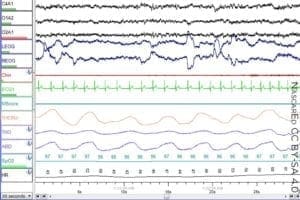
A study conducted at the University of California Berkley recently found links between particular patterns of sleep and a diagnosis of Alzheimer’s Disease.
Matthew Walker, PhD and colleagues used polysomnography (more commonly known as a sleep study) to compare patterns of sleep with the levels of two proteins, amyloid beta and tau. These proteins have both been found to create plaques and tangles in the brain of individuals with Alzheimer’s disease. Study subjects who showed a decrease in slow oscillations and reduced slow-wave activity amplitude both had high levels of tau and amyloid-beta, respectively.
The research team was excited to find that sleep studies may aid in predicting changes of proteins in the brains of cognitively healthy older adults, possibly leading to an earlier diagnosis of the memory impairment.
Source: https://www.medpagetoday.com/neurology/alzheimersdisease/80534




